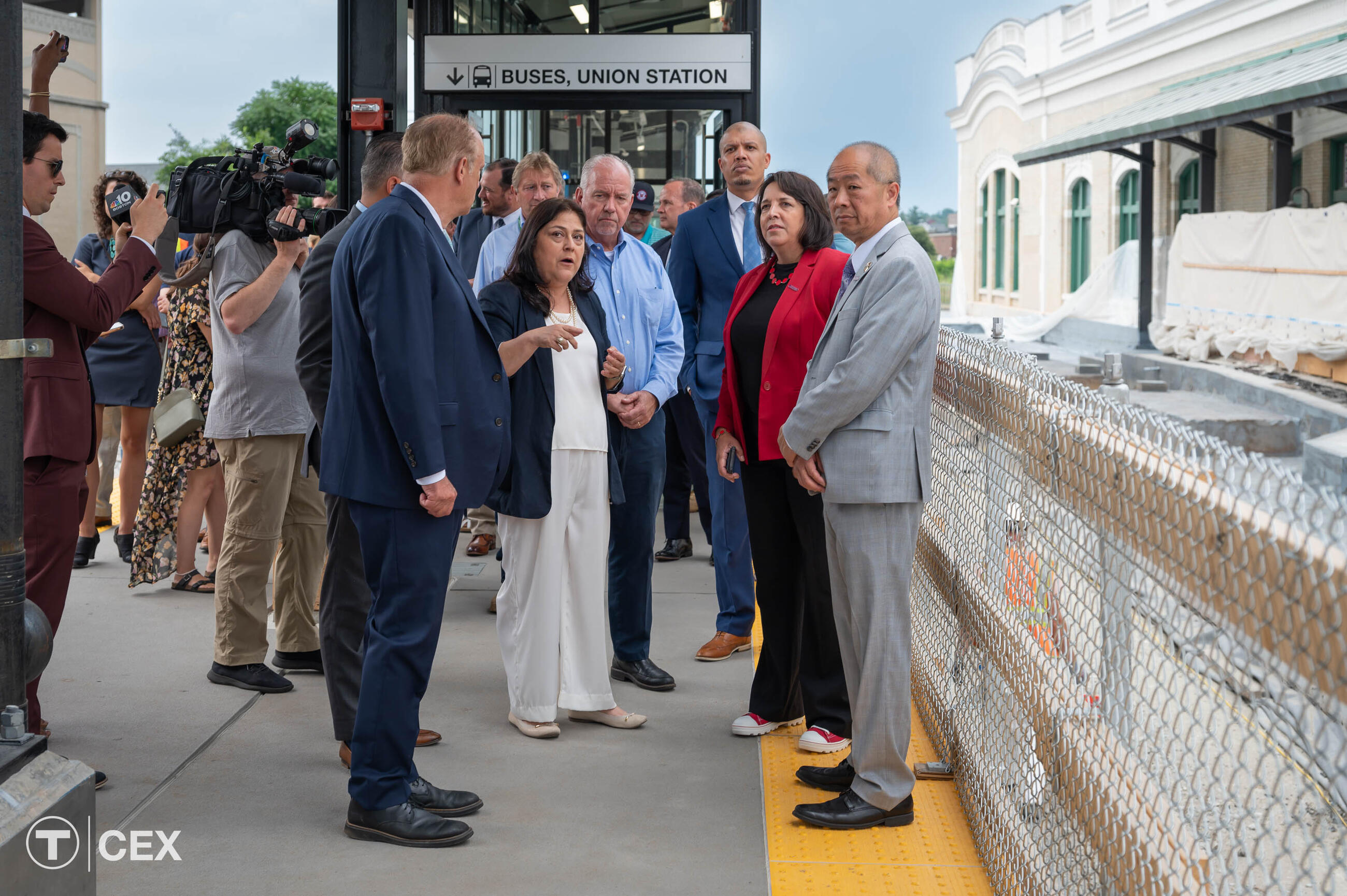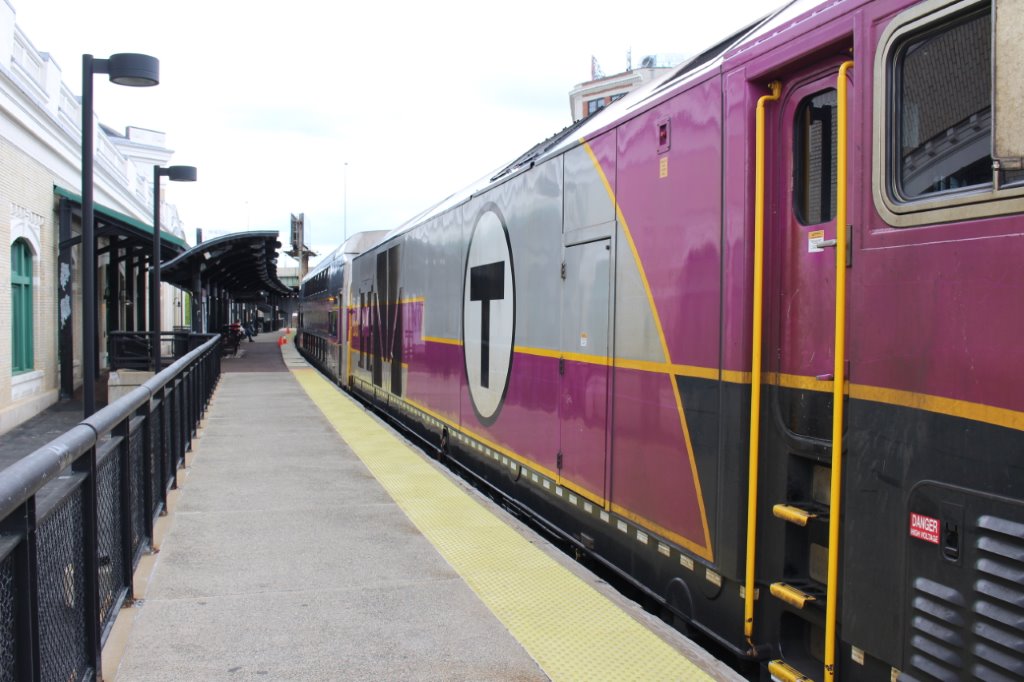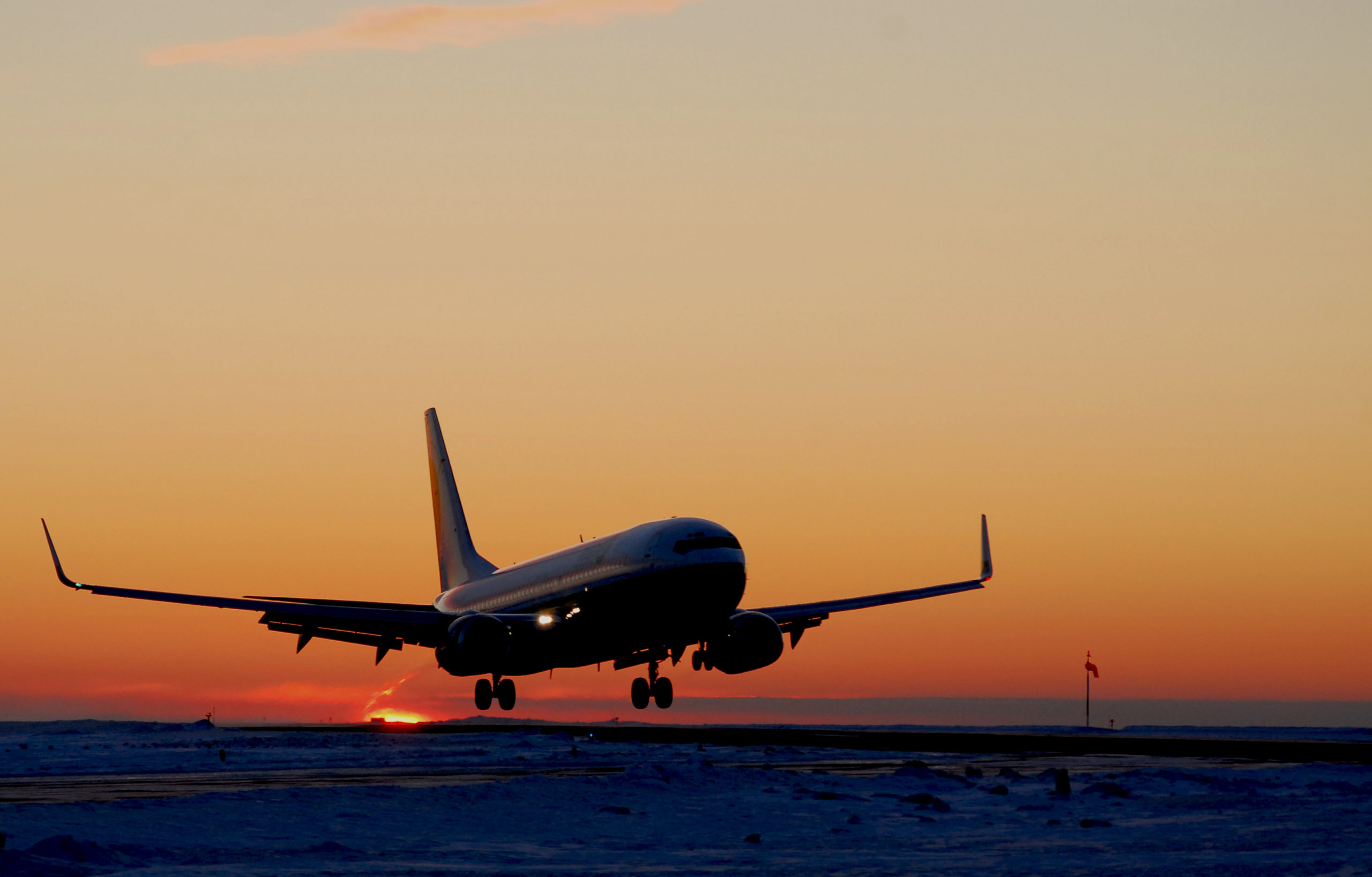Transportation Initiatives
The following brief outlines initiatives that the Chamber has been working on regarding transportation-related issues and opportunities, on behalf of our members and the entire business community.
Union Station Center Platform
The center platform is a major upgrade to Union Station, enabling two commuter rail trains to enter the station at the same time. Before the project was be completed, service at Union Station was limited because only one train at a time could enter the station. Delays can cause a “cascade” effect resulting in tightly scheduled trains needing to queue outside the station. With train service increasing between Boston and Worcester, as well as the addition of new service by Amtrak between Boston and Springfield, the new platform, which opened in July 2024 will be able to accommodate an increase in traffic along one of the state’s busiest East-West rail lines.

MBTA Union Station Center Platform (Photo Credit MBTA)
__________________________________________________________________________________________________________
MBTA: Heart-to-Hub Express
Beginning Service in 2016, the Heart-to-Hub Express train operated by Keolis, the MBTA’s commuter rail operator, offered commuters a one-hour rail service from Worcester to Boston that was fast, reliable, and convenient.  According to Tim Murray, President and CEO of the Worcester Regional Chamber of Commerce, “the Heart-to-Hub Express train is an imperative piece of transportation infrastructure for Worcester, as the train would link workers to high tech and new economy start-up companies, spurring economic development in both cities.” However, in October 2023, the MBTA’s fall schedule was unveiled, which eliminated the morning and evening express trains, and added 30 minutes to commuters’ travel time when they. In response to the elimnation of the Heart-to-Hub, the community along with local, state and business offcials worked collectivly to restore service in May 2024 showcasing why this express trains is imperative to the transportation infrastructure and the economic development of Worcester
According to Tim Murray, President and CEO of the Worcester Regional Chamber of Commerce, “the Heart-to-Hub Express train is an imperative piece of transportation infrastructure for Worcester, as the train would link workers to high tech and new economy start-up companies, spurring economic development in both cities.” However, in October 2023, the MBTA’s fall schedule was unveiled, which eliminated the morning and evening express trains, and added 30 minutes to commuters’ travel time when they. In response to the elimnation of the Heart-to-Hub, the community along with local, state and business offcials worked collectivly to restore service in May 2024 showcasing why this express trains is imperative to the transportation infrastructure and the economic development of Worcester
___________________________________________________________________________________________________________
West-East Rail, “Compass Rail”
Currently, train service between Springfield and Boston is serviced once a day by Amtrak’s Lake Shore Limited which operates daily between Boston and Chicago. However, as of September 2023, more frequent train service between Springfield and Boston is on the horizon as the federal government awarded a grant of $108 million that will be utilized for rail infrastructure improvements between Worcester and Springfield. The Healey-Driscoll Administration announced, along with the MassDOT, in partnership with Amtrak, and with support from CSX, that the Commonwealth will receive funding, which will be used towards the $135 million East-West Rail Infrastructure Project, known as “Compass Rail,” between Boston and Springfield. The funding will be used to facilitate two new Amtrak Inland Route daily round trips between Boston, Worcester, Springfield, and on to New York City. As well, the project will include track improvements between Worcester and Springfield, so trains can operate at higher speeds. According to Meredith Slesinger, the rail and transit administrator for MassDOT, “improving the class of track means that we can get to that two-hour travel time between Boston and Springfield.” The Chamber believes East-West Rail is an essential part of connecting all parts of the state to not only Boston but all of New England and to New York City. On October 13th, 2023, the Chamber hosted its 8th annual Game Changers, which focused on rail as being a key transportation piece that is imperative to the movement of goods and people by providing critical connections across the New England region and beyond. As well, in June 2024 the Chamber hosted, Andy Koziol, the MassDOT West-East Rail Coordinator for a conservation on the future of West-East Rail.
___________________________________________________________________________________________________________
Freight Rail
The Worcester Regional Chamber of Commerce continues to advocate to expand funding for the Commonwealth’s Industrial Rail Access Program (IRAP) with accountability measures that guarantee bi-annual allocations by these matching grants. On March 19, 2020, the Chamber hosted a Business & Government Forum regarding this measure. Representatives from MassDOT, along with the Massachusetts Rail Association and representatives from the Central Massachusetts freight rail companies, discussed the needs that these companies need in order to continue to combat our growing congestion issues. In June of 2022 the Class I railroad in Worcester, CSX, completed its acquisition of Pan Am Railways, Inc. The acquisition expands CSX’s reach into the Northeast and demonstrates CSX’s growth strategy through efficient and reliable freight service for the region. In October 2023, the Chamber, for its President Council Meeting hosted the President and CEO of CSX, Joseph Hinrichs, to discuss the importance of the expansion of CSX for freight rail in the region.

(Photo Credit T&G File Photo / Rick Cinclair)
___________________________________________________________________________________________________________
Port of Worcester
Port of Entry for Worcester is the largest inland port in New England, which accepts and distributes thousands of goods each year from foreign countries. Goods come to the Port of Entry in three main ways, by rail, truck, or plane. The U.S. Customs and Border Protection office in Worcester is tasked with processing the shipments, mainly from rail at the Port. After being processed, the shipments are distributed throughout the entire Eastern Corridor, by rail or truck. The main advantage of the Port of Worcester is that it allows local shippers to process their goods from foreign markets more quickly than at larger ports such as Boston, Providence, and New York/New Jersey. The Port of Worcester mainly moves consumer goods, such as textiles, recreation equipment, food, medicine, household furnishing, raw materials, and parts used in various manufacturing industries.
___________________________________________________________________________________________________________
Rail Vision Commission
A commission was created to “identify cost-effective strategies to transform the existing commuter rail system into one that better supports improved mobility and economic competitiveness in Greater Boston.” As a member of the Rail Vision Commission, the WRCC continues to advocate for Rail Traffic Controller (RTC), a tool that simulates the movement of trains through rail networks at a detailed and realistic level (MBTA, Amtrak, NJT, BNSF, CSX and many more). This information is used for rail infrastructure (switches, signals, platforms, grades, and speeds). It is also used for train dispatching logic to oversee vehicle performance, braking, signal logic, PTC, train routing, and conflict resolution. Lastly, RTC dispatches statistics to mitigate upcoming issues such as on-time performance, revenue/non-revenue miles, average speed, and delays.
___________________________________________________________________________________________________________
Massachusetts Business Coalition on Transportation (MBCT)
The Massachusetts Business Coalition for Transportation was established to determine the possibility of building a consensus among the state’s business organizations and help guide elected and appointed leadership in moving Massachusetts closer to a first-class and responsive statewide transportation system. After nearly six months of meetings and work (including conversations and a survey of participant business organizations), by more than two dozen business stakeholder organizations, there was near-unanimous consensus among the groups on the need for additional revenue for transportation.
___________________________________________________________________________________________________________
Free-Fare WRTA
Through the MBCT, the Worcester Regional Chamber published its position paper outlining our top priorities including those specific to our region. The Chamber is advocating for funding of a three-year pilot program that would allow free access to bus services for riders of buses operated by Worcester Regional Transit Authority. Additionally, the Chamber supports the implementation of many reforms outlined in the Taskforce on RTA Performance and Funding’s “A Vision for the Future of Mass RTA.” Finally, the Chamber supports the Worcester Regional Research Bureau’s report, “The Implications of a Fare-Free WRTA,” which touts the merits of implementing a pilot program for fare-free service. Fare-Free service was extended to June of 2025.
___________________________________________________________________________________________________________
Massport | Worcester Regional Airport
Since Massport purchased the Worcester Regional Airport from the City of Worcester in 2010, the Chamber has appreciated and supported the efforts across two gubernatorial administrations and changes in Massport’s leadership to advance the Worcester Regional Airport for commercial aviation. Since 2010, considerable progress has resulted in more than 1 million passengers being served and an estimated economic impact of $97 million for the region.  The presence of JetBlue, American Airlines, and Delta has facilitated incremental growth at Worcester Regional Airport. In 2020 the Chamber conducted a Passenger Survey of the residents in the Central Massachusetts region. The results from the survey showed that 93% of the 1,300 respondents were “very likely” or “likely” to fly out of Worcester if there was a direct connection to a location they desired. The top destinations that travelers would like to see service out of Worcester were Chicago, Washington DC, and Atlanta. In April 2023, JetBlue expanded service at the Airport by offering a daily flight round trip flight to Orlando, Florida, and a winter seasonal round-trip flight to Fort Myers, Florida. However, at the expense of the two (2) newly added Florida flights, JetBlue terminated the late return and early morning departure commuter flight to New York’s JFK International Airport. In 2023, the airport had over 204,000 passengers fly in and out of Worcester. The Chamber will continue to work with Massport to boost the Worcester Regional Airport as a supplement to flying out of Logan.
The presence of JetBlue, American Airlines, and Delta has facilitated incremental growth at Worcester Regional Airport. In 2020 the Chamber conducted a Passenger Survey of the residents in the Central Massachusetts region. The results from the survey showed that 93% of the 1,300 respondents were “very likely” or “likely” to fly out of Worcester if there was a direct connection to a location they desired. The top destinations that travelers would like to see service out of Worcester were Chicago, Washington DC, and Atlanta. In April 2023, JetBlue expanded service at the Airport by offering a daily flight round trip flight to Orlando, Florida, and a winter seasonal round-trip flight to Fort Myers, Florida. However, at the expense of the two (2) newly added Florida flights, JetBlue terminated the late return and early morning departure commuter flight to New York’s JFK International Airport. In 2023, the airport had over 204,000 passengers fly in and out of Worcester. The Chamber will continue to work with Massport to boost the Worcester Regional Airport as a supplement to flying out of Logan.

